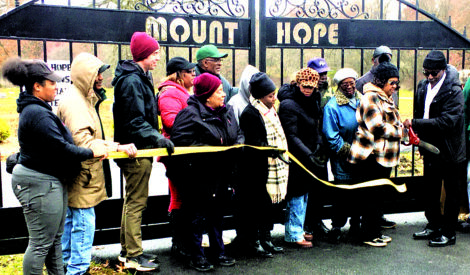Elections board confuses 2 open meetings suits
YOUNGSTOWN — The Mahoning County Board of Elections failed to respond to a case accusing it of repeatedly violating Ohio’s Open Meetings Act by improperly going into executive session because it confused the lawsuit with a different one filed by the same person.
Jacqueline Johnston, a county assistant prosecutor, submitted a motion in the latest case to county Common Pleas Judge Maureen Sweeney asking for time to respond to the lawsuit, citing “excusable neglect.”
In her June 12 filing, Johnston wrote the board was served with the most recent complaint from Brian M. Ames of Randolph Township in Portage County — who has sued multiple government entities throughout the state on meeting act violations — on Jan. 13.
That was about three weeks after the 7th District Court of Appeals overturned Sweeney’s dismissal of a separate lawsuit filed by Ames against the board of elections for holding what he called improper executive sessions four times: Sept. 7, 2021, Feb. 12, 2022, April 14, 2022, and Aug. 22, 2022, and failing to maintain proper meeting notices for the first three of those meetings.
Johnston wrote, “Due to the case having both the same caption as well as the same court assignment, the MCBOE (Mahoning County Board of Elections) inadvertently failed to forward the new complaint to (her) under the impression that it was a pleading related to the 2022 case and not a new complaint and case entirely.”
Ames filed his latest case Jan. 8 against the board, claiming it held executive sessions four additional times “for a subject matter not specifically excepted by law.”
Those four meetings, according to Ames’ lawsuit, were Oct. 11, 2022, Aug. 16, 2023, Aug. 28, 2023, and Nov. 16, 2023.
Under state law, government entities can be sued for $500 for each meetings act violation. The Ohio Supreme Court ruled Dec. 22, 2022, in Ames’ favor that he could sue governments and receive $500 for each violation.
Ames, who’s been dubbed an open records “bounty hunter,” has sued numerous government bodies in Ohio, and has either won or received settlements on more than 40 cases. That includes at least nine local governments in Trumbull County.
Ames has said he doesn’t file the lawsuits for the money, but “because of the people’s right to know what their government is doing and when they’re violating the law.”
A retired electrical engineer, Ames handles much of the legal work on the lawsuits himself with the assistance of three attorneys. If Ames wins a case or gets a settlement using the attorneys, he said they are reimbursed their fees from the government entities.
Ames’ first lawsuit against the elections board, filed Aug. 29, 2022, is on hold after a mediator in that case filed an April 16 report that Ames was going to file a companion case with additional alleged violations and ask the court to consolidate the cases.
Ames’ second case was filed Jan. 8 with Sweeney issuing a June 4 judgment entry that the case would be dismissed Aug. 19 for “want of prosecution,” and Ames could seek default judgment.
Barry Ward, Ames’ attorney in this case, filed a motion for default and summary judgment on June 10, seeking the civil forfeiture of $2,000 — $500 for each alleged violation — as well as court costs and attorney fees.
Two days later, Johnston responded seeking additional time to file a response because of the mixup at the board.
She wrote she plans to file a response in opposition to the motion for default and summary judgment.
Johnston added Ames did not forward a “courtesy copy” of the complaint to her.
Ward objected to Johnston’s request for additional time, writing June 13, “It is inconceivable that the board chairman, attorney David Betras, would not have recognized a summons and complaint as a new case.”
He added, “The board first bemoans confusion with” the first case, “which lingers on due to the board’s filing a motion to dismiss, and then it seeks to similarly squander judicial resources on this case by inviting this court to depart from the Rules of Civil Procedure.”
Ward wrote that “excusable neglect” is “properly addressed after a final judgment has been entered,” and for the board to request it now “invites this court to plunge into a legal thicket where all manner of mischief resides. This court must decline the board’s invitation by denying its motion.”
Ward also mentioned that Ames is under no obligation to forward a courtesy copy to opposing legal counsel as that is the responsibility of the county clerk of courts.
Have an interesting story? Contact David Skolnick by email at dskolnick@vindy.com. Follow him on X, formerly Twitter, @dskolnick.


